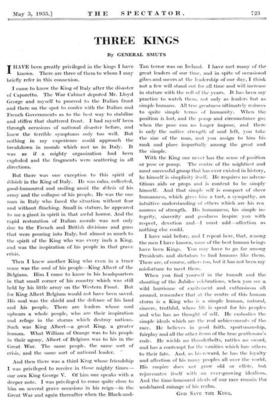TBREE KINGS
By GENERAL SMUTS
IHAVE.been greatly privileged in the kings I have known. There are three of them to whom I may briefly refer in this connexion.
I came to know the King of Italy after the disaster of Caporetto. The War Cabinet deputed Mr. Lloyd George and myself to preeeed to the Italian front and there on the spot to confer with the Italian and French Governments as to the best way to stabilize and stiffen that shattered front: I had myself been through occasions of national disaster before, and knew the terrible symptoms only too well. But nothing in my experience could approach the breakdown in morale which met us in Italy. It was as if a mighty organization had been exploded and the fragments were scattering in all directions.
But there was one exception to this spirit of debacle in the King of Italy. He was calm, collected, good-humoured and smiling amid the debris of his army and the collapse of his people. He was the one man in Italy who faced the situation without fear and without flinching. Small in stature, he appeared to me a giant in spirit in that awful horror. And the rapid restoration of Italian morale was not only due to the French and British divisions and guns that were pouring into Italy, but almost as much to the spirit of the King who was every inch a King, and was the inspiration of his people in that grave crisis.
Then knew another King who even in a truer sense was the soul of his people—King Albert of the Belgians. Him I came to know in his headquarters in that small corner of his country which was still held by his little army on the Western Front. But for King Albert Belgium would not have been saved. His soul was the shield and the defence of his land and his people. There are leaders whose soul upbears a whole people, who are their inspiration and refuge in the storms which destroy nations. Such was King Albert—a great King, a greater human. What William of Orange was to his people in their agony, Albert . of Belgium was to his in the Great War. The same people, the same sort of crisis, and the same sort of national leader.
And then there was a third King whose friendship I was privileged to receive in those mighty times— our own King George V. Of him one speaks with a deeper note. I was privileged to come quite close to him on several grave occasions in his reign—in the Great War and again thereafter when the Black-and-
Tan terror was on Ireland. I have met many of the great leaders of our time, and in spite of occasional gibes and sneers at the leadership of our day, I think not a few will stand out for all time and will increase in stature with the roll of the years. It has been my practice to watch them, not only as leaders but as simple humans. All true greatness. ultimately reduces to quite simple terms of humanity. When the position is lost, and the pomp and circumstance go; when the pose can no longer impose, and there is only the native strength of soul left, you take the size of the man, and you assign to him his rank and place impartially among the great and the simple.
With the King one never has the sense of position or pose or pomp. The centre of the mightiest and most successful group that has ever existed in history, he himself is simplicity itself. He requires no adven- titious aids or props and is content to be simply himself. And that simple self is compact of sheer humanness, which gives hint a tact, a sympathy, all intuitive understanding of others which are his rea sources of strength. His humanness, his simple in tegrity, sincerity and goodness inspire you with respect, devotion and—I must add—affection as nothing else could.
I have said before, and I repeat here, that, among the men I have known, some of the best human beings have been Kings. You may have to go far among Presidents and dictators to find huthans like theM. There are, of course, others too, but it has not been my misfortune to meet them.
When you find yourself in the tumult and the shouting of the Jubilee celebrationS, when you see a wild hurricane of excitement and enthusiasm all around, remember that at the centre of this human storm is a King who is a simple human, natural, sincere, truthful, whose life is spent for his peoples and who has no thought of self. He embodies the simple ideals which are the real achievements of the race. He believes in good faith, sportsmanship, fairplay and all the other items of the true gentleman's code. He wields no thunderbolts, rattles no sword, and has a contempt for the vanities which lure others to their fate. And, as his reward, he has the loyalty and affection of his many peoples all over the world. His empire does not grow old or effete, but rejuvenates itself with an ever-growing idealism. And the time-honoured ideals of our race remain the undebased coinage of his realm.
GOD SAVE THE KING.














































 Previous page
Previous page